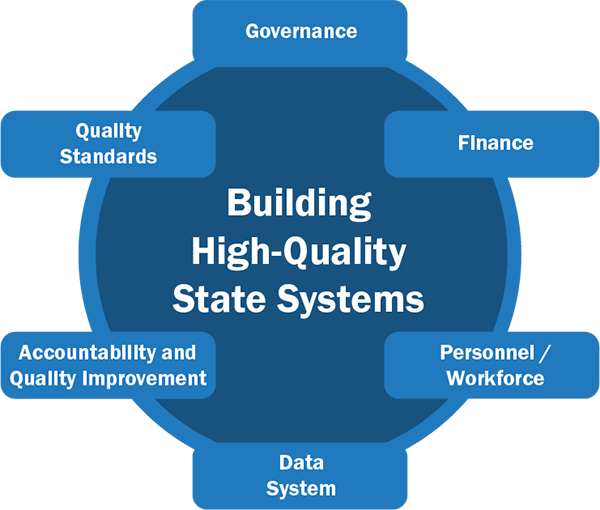General Supervision of State Part C Systems
Topic Editor: Anne Lucas
anne.lucas@unc.eduThe primary focus of state monitoring activities is on improving educational results and functional outcomes for all children with disabilities; and ensuring that states meet the program requirements of IDEA, with a particular emphasis on those requirements that are most closely related to improving educational results for children with disabilities. In accordance with 20 U.S.C. §1416, states must have in place a general supervision system that monitors implementation of IDEA by early intervention programs (whether or not they receive Part C funds), and local education agencies statewide.
Part C General Supervision Monitoring Procedures Checklist
This This checklist can be used by Part C lead agencies:
- to assess whether or not the lead agency's current procedures include the necessary elements to effectively monitor the implementation of the IDEA;
- to help evaluate, prioritize, or improve specific parts of the general supervision system;
- in preparation for participation in the Differentiated Monitoring and Support (DMS 2.0) process; and
- in tandem with the Accountability and Quality Improvement Component of the System Framework.
Differentiated Monitoring and Support (DMS) 2.0
States' general supervision systems are monitored by OSEP through the Differentiated Monitoring and Support (DMS) 2.0 process, which focuses on both compliance and results related to the core components of an effective state general supervision system.
Core Components of an Effective State General Supervision System
Core components of an effective state general supervision were first identified in 2007 by The National Center for Special Education Accountability Monitoring (NCSEAM) in collaboration with the regional resource centers, the Federal Regional Resource Center, the National Early Childhood Technical Assistance Center, and representatives from state agencies, the National Association of State Directors in Special Education, and the IDEA Infant and Toddlers Coordinators Association. These core components are outlined in the following documents:
- Developing and Implementing an Effective System of General Supervision (2007)
- Concepts of General Supervision: Accountability for Implementation and Improved Results (2007)

ECTA System Framework: Accountability and Quality Improvement Component
The Accountability and Quality Improvement component of the System Framework guides state Part C and Section 619 Coordinators, their staff and partners in an ongoing process of reviewing and evaluating the Part C and Section 619 systems to identify areas for statewide improvement. The process provides direction on determining strategies that achieve a quality, effective, and efficient system to support implementation of evidence-based practices leading toward improved outcomes for children and their families. This component assists state leaders in assessing and improving all other components of the framework.
Improving Part C Results and Compliance: A Six-Step Inquiry Cycle
These six steps describe a chronological process to assist states in selecting a focus area, collecting and using data to monitor this focus area, completing root cause analyses of the current performance, planning for and evaluating progress to resolve issues effectively, and implementing continuous and sustainable improvement. Since improving results and ensuring compliance is an ongoing process the six steps of inquiry should be used as an iterative cycle as infrastructure and practice improvements continue to be made.
Identifying, Correcting, and Reporting Noncompliance: A State Guide
The Individuals with Disabilities Education Act (IDEA) requires states to monitor and enforce IDEA Part C and Part B requirements, with a primary focus on those requirements that are most closely related to improving results and functional outcomes for infants, toddlers, and children with disabilities. To support states to carry out these monitoring responsibilities, Identifying, Correcting, and Reporting Noncompliance: A State Guide describes the IDEA requirements related to identifying noncompliance, making findings of noncompliance, correcting and verifying correction of noncompliance, and federal reporting on compliance and correction of noncompliance in the state's SPP/APR. This guide is based on the Office of Special Education Programs (OSEP) QA 23-01: State General Supervision Responsibilities Under Parts B and C of the IDEA.
Streamlining and Integrating Part C General Supervision Activities: Monitoring and Program Improvement
There are three ways to use these resources and framework to identify where and how monitoring and program improvement activities can be streamlined and better integrated to meet both state needs and national reporting requirements. The guide shows the steps, their challenges, and visit links to related resources you can use for each step.
